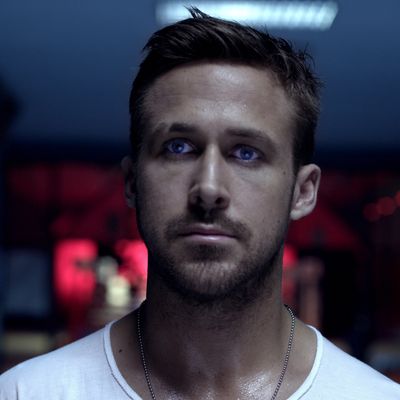
In the magical kingdom of Upside-Down-Opposite Land, Only God Forgives — which marks the reunion of Drive director Nicolas Winding Refn and star Ryan Gosling — is an entrancing masterwork. Here you will find a revenge melodrama set in the innermost chamber of the heart of darkness, its faces bathed in blood red, its ceremonial action slowed to a crawl and held up for ghastly inspection, as in a Japanese Noh play. Every gesture becomes ritualized, every fate foreshadowed. The characters transcend individuality and become archetypes: the avenger too paralyzed by fear and self-doubt to take action, afraid of his own capacity for evil; the warrior with his own rigid moral code, his full-throated voice raised in song at the end of each holy rite of violence; the demonic matriarch, ever hungry for more bodies, more souls. Set in Bangkok — where one night, a song once said, will make a hard man humble and the tough guys tumble — the film is as pure, as concentrated, as elemental as Artaud’s Theater of Cruelty.
That, anyway, is the Upside-Down-Opposite Land review and a variation of the one I expect to read in many places, especially by critics who found Drive such a stylish exercise in stylized style. In my own world, Only God Forgives plays somewhat differently. I thought it was just about the worst fucking thing I’ve ever seen. In fact, I was depressed it wasn’t laughed off the screen. At the very least, the audience could have talked back to it: God knows, there were enough long pauses begging to be filled by people yelling for Ryan to take off his shirt or doing impromptu a cappella renditions of Bach’s Toccata and Fugue in D Minor. Shadow puppets on the screen biting Ryan’s nose would work, too.
Gosling looked like a major actor as a skinhead in The Believer and a star in Half Nelson. Then he stopped acting and started posing. His performance in Only God Forgives (would God forgive that title?) is one long, moist stare, although it’s hard to imagine he can see anything amid the crimson gloom or the rain that raineth. He is afraid even to touch the lovely prostitute (pop star Yayaying Rhatha Phongam) he hires most nights — she must touch herself while he watches. For some inexplicable reason, he brings her to meet his monster mom and ends up in an alleyway Saatchi-ing her by the throat. But she is fundamentally a sweet girl who I feel sure would defend his reputation if the pictures came out.
Vithaya Pansringarm is the ex-cop with the long sword wedged into the back of his trousers — I, for one, would be nervous about accidentally sitting down and severing my privates. Perhaps that is why he walks so deliberately. The whistle of steel every time he pulled it out was enough to make me cross my legs. The extreme gore is Dinner Theater of Cruelty. His songs in an empty nightclub — attentively watched by the cops who serve him — are a paler shade of David Lynch with none of the Lynchian frissons.
Kristin Scott Thomas comes off best as Hellmom, largely because the camp of her role slices through the movie’s solemnity the way the ex-cop’s sword slices through flesh and bone. But she is very good. This is the one place where the real world and Upside-Down-Opposite Land intersect — an event with the potential to rupture the space-time continuum and a fertile area for Christopher Nolan’s next three-hour film about illusion, reality, and the ease with which you can psych an audience out by pretending what you’re saying is of cosmic importance.


